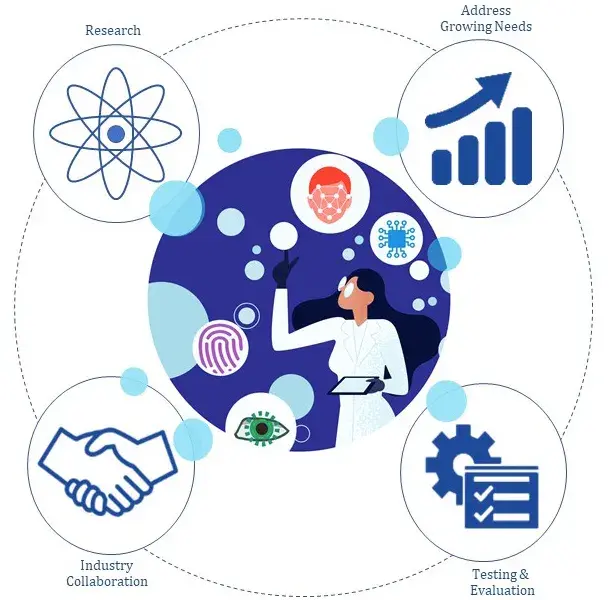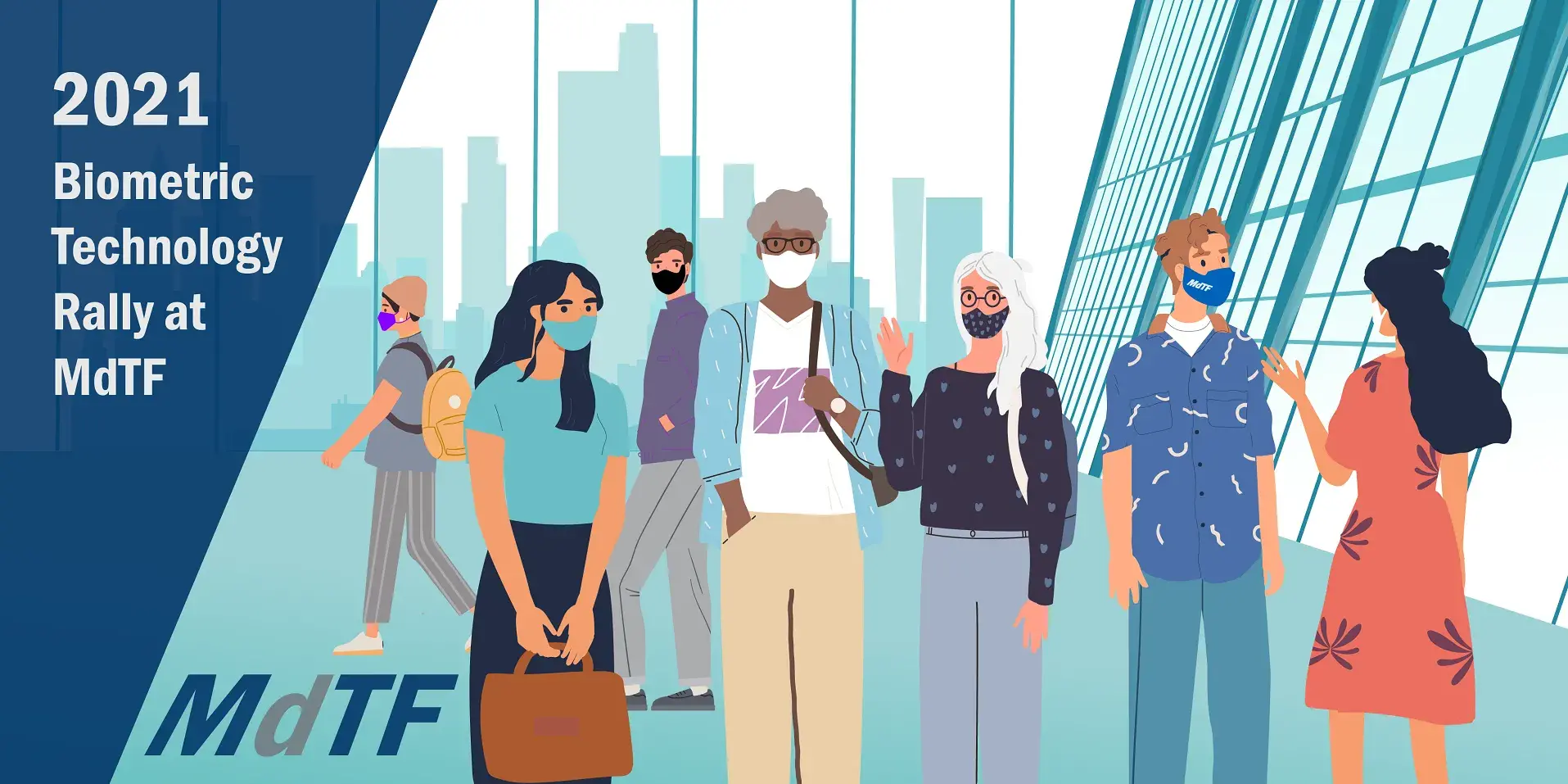 The Biometric and Identity Technology Center (BI-TC) establishes an enduring core capability by leveraging S&T’s biometric and identity expertise and capabilities to enable the re-use of biometric tools, methods, and best practices.
The Biometric and Identity Technology Center (BI-TC) establishes an enduring core capability by leveraging S&T’s biometric and identity expertise and capabilities to enable the re-use of biometric tools, methods, and best practices.
The BI-TC provides objective biometric and identity capabilities to DHS, enables operational components to cost-effectively use new technologies, and informs strategic planning and acquisitions of new biometric and identity capabilities. The BI-TC supports robust testing and evaluation at the Maryland Test Facility (MdTF) to inform applications of biometric technology to specific operational use cases across DHS, and the homeland security community.
For more information please view the BI-TC Factsheet.
- News Release: DHS S&T Announces New Remote Identity Validation Rally
- Technologically Speaking Podcast: The Three-legged Stool
- News Release: DHS Announces Results of 2022 Biometric Technology Rally
- News Release: DHS S&T Calls for Submissions to 2022 Biometric Tech Rally
- Feature Article: Implementing Mobile Driver’s Licenses: Not as Easy as You Think
- News Release: Airport Screening While Wearing Masks Test
- News Release: DHS S&T Calls for Submissions to Biometric Tech Rally
Peer Reviewed Journal Articles
- Human-algorithm Teaming in Face Recognition: How Algorithm Outcomes Cognitively Bias Human Decision-making. (PLoS ONE)
- The Effect of Broad and Specific Demographic Homogeneity on the Imposter Distributions and False Match Rates in Face Recognition Algorithm Performance. (IEEE/BTAS)
- Demographic Effects in Facial Recognition and their Dependence on Image Acquisition: An Evaluation of Eleven Commercial Systems (IEEE/TBIOM)
- Measuring Satisfaction with Standard Survey Instruments and Single-Button Responses on Kiosks. (HRES)
- Operational Tradeoffs in the 2018 Department of Homeland Security Science and Technology Directorate Biometric Technology Rally. (IEEE)
- An Investigation of High-Throughput Biometric Systems: Results of the 2018 Department of Homeland Security Biometric Technology Rally. (IEEE/BTAS)
- On Efficiency and Effectiveness Tradeoffs in High-Throughput Facial Biometric Recognition Systems. (IEEE/BTAS)
- Usability of Biometric Iris Capture Methods in Self-service Applications. (HRES)
Technical Papers Series
- Demographic Effects Across 158 Facial Recognition Systems
- A Scenario Evaluation of High-Throughput Face Biometric Systems: Select Results from the 2019 Department of Homeland Security Biometric Technology Rally
Fact Sheets
NYAST Forum: Understanding Biometrics and Face Recognition:
Emerging Technology: Challenges and Opportunities for Mobile Driver’s License (mDL) and Digital IDs:
Face Image Quality Expectations and Factors Affecting Performance (November 16, 2021). Presentation by Arun Vemury at the Workshop on Face Image Quality, November 16-18, 2021. European Association for Biometrics.
Demographic Correlates of Mated Scores: Implications for Face Image Quality (November 16, 2021). Presentation by Yevgeniy Sirotin at the Workshop on Face Image Quality, November 16-18, 2021. European Association for Biometrics.
Variation in the Performance of Biometric Systems: Insights Gained from Large-Scale Scenario Testing. This presentation describes how data collected from these large scale scenario tests have addressed demographic effects in face recognition technologies, explains the role of image acquisition in shaping demographic differences in face recognition systems, and summarizes the implications of demographic differences in face recognition system performance for different use-cases.
International Face Performance Conference (IFPC)—Focuses on all technical factors affecting the deployment and use of high-performance face recognition applications.
- Human Algorithm Teaming in Face Recognition (2020). S&T presentation starts at the beginning of International Face Performance Conference (IFPC) 2020 - Day 1 Part 2 | NIST People are often asked to review the results of face recognition algorithms. But, we show that these results change peoples’ opinions of face similarity. We talk about how to best combine people and algorithms on face recognition tasks.
- Quantifying Race and Gender Effects In Face versus Iris Algorithms (2020). S&T presentation starts at 1:15:39 of International Face Performance Conference (IFPC) 2020 - Day 1 Part 2 | NIST. There is growing public concern about “bias” in commercial face recognition algorithms. We found race and gender differences in face, but not in iris algorithm performance. We discuss how to reduce demographic performance differences in face recognition.
- Revisiting the Fitzpatrick Scale and Face Photo Based Estimates of Skin Phenotypes (2020). S&T presentation start at 1:57:54 of International Face Performance Conference (IFPC) 2020 - Day 3 Part 1 | NIST. Computer scientists are measuring how well face recognition works for diverse people by classifying face photos using the Fitzpatrick Skin Type (FST). We explain why using FST this way is problematic and propose better ways to measure how well face recognition works for diverse people.
- Estimating Relative Skin Reflectance and Measuring its Effect on Face Recognition (2018)
- Evaluation of Rapid Face Capture Devices (2018)
- Usability and User Perceptions of Self-Service Biometric Technologies (2016)
- Efficient Test Design for Biometric Exit Scenarios (2016)
- Scenario Tests for Immigration Exit (2016)
- Iris Vendor Results from the 2018 Biometric Technology Rally. Iris Experts Group 2018 Meeting

